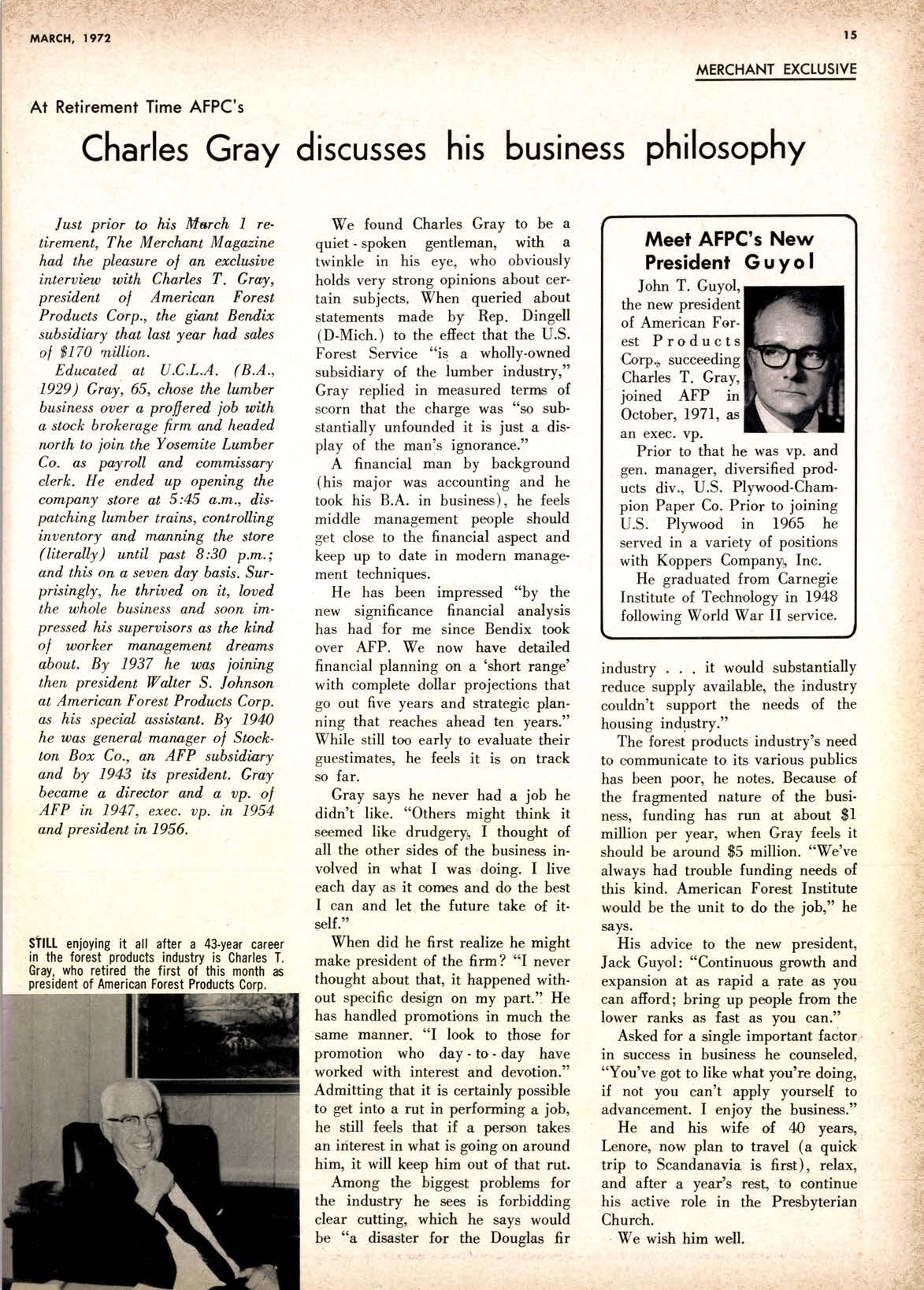
3 minute read
Charles Gray discusses his business philosophy
tust prior to his March I retirement, The Merchant Magazine hnd the pleasure ol an exclusiue interuiew with Charles T. Grory, president tl American Forest Prod,ucts Corp., the gia.nt Benilix subsidiary that last year had, sales of fi170 mihlion.
Edwated, at a.C.L.A. (8.A., 1929) Cray, 65, chose the lumber business ouer d profrereil job with a stock brokerage firm and, head,ed rnrth to join the Yosernite Lurnber Co. as pa,yroll and, commissary clerk. He end,ed up opening the conpany store at 5:45 a.m,, dispatching lumber traiw, controlling inuentory anil manning th.e store (literally) until past 8:30 p.m,; and this on a seaen d.ay basis. Surpr*ingly, he thriued on it, loued the whole business and, soon impressed his superaisors as ilte kind, ol uorker ma,n"agem,ent d,reams about By 1937 he was joining then presid,ent Wa,her S. Iohnson at American Forest Prod,uc* Corp. as his special assistant. By 1940 he was general tnannger ol Snckton Box Co., an AFP subsidinry and by 1943 its presiilent. Gray became a director anil a ap. ol AFP in 1947, exec. op. in 1954 and, presiderrt in 1956.
SfILL enjoying it all after a 43-yea career ir the forest products industry is Charles T. Gray, who retired the first of this month as president of American Forest Products Corp.
We found Charles Gray to be a quiet - spoken gentleman, with a twinkle in his eye, who obviouslY holds very strong opinions about certain subjects. When queried about statements made by R"p. Dingell (D-Mich.) to the efiect that the U.S. Forest Service "is a wholly-owned subsidiary of the lumber industry," Gray replied in measured ternrs of scorn that the charge was t'so substantially unfounded it is just a display of the man's ignorance."
A financial man by background (his major was accounting and he took his B.A. in business). he feels middle management people should get close to the financial aspect and keep up to date in modern management techniques.
He has been impressed "by the new significance financial analysis has had for me since Bendix took over AFP. We now have detailed financial planning on a 'short range' with complete dollar projections that go out five years and strategic planning that reaches ahead ten years." While still too early to evaluate their guestimates, he feels it is on track so far.
Gray says he never had a job he didn't like. 'oOthers might think it seemed like drudgery5 I thought of all the other sides of the business involved in what I was doing. I live each day as it cornes and do the best I can and let the future take of itself."
When did he first realize he might make president of the firm? otl never thought about that, it happened with. out specific design on my part." He has handled promotions in much the same manner. "I look to those for promotion who day - to - day have worked with interest and devotion." Admitting that it is certainly possible to get into a rut in performing a job, he still feels that if a person takes an interest in what is going on around him, it will keep him out of that rut.
Among the biggest problems for the industry he sees is forbidding clear cutting which he says would be 'oa disaster for the Douelas fir
Meet AFPC's New President Guyol
John T. Guyol, the new president of American Forest Products 'Corp.,, succeeding Charles T. Gray, joined AFP in October, 1971, as an exec. vp.
Prior to that h gen. manager, diversified products div., U.S. Plywood-Champion Paper Co. Prior to joining U.S. Plywood in 1965 he served in a variety of positions with Koppers Company, Inc.
he was vp. and industry . it would substantially reduce supply availablg the industry cnouldn't support the needs of the housing indpstry."
He graduated from Carnegie Institute of Technology in 1948 following World War II service.
The forest products industry's need to communicate to its various publics has been poor, he notes. Because of the fragmented nature of tlle business, funding has run at about Sl million per year, when Gray feels it should be around $5 million. o'W'erve always had trouble funding needs of this kind. American Forest Institute would be the unit to do the job," he says.
His advice to the new president, Jack Guyol: "Continuous growth and expansion at as rapid a rate as you can afford; bring up people from the lower ranks as fast as you can."
Asked for a single important factor in success in business he counseled, "You've got to like what you're doing, if not you can't apply yourself to advancement. I enjoy the business."
He and his wife of 4O years, Lenore, now plan to travel (a quick trip to Scandanavia is first), relax, and after a year's rest, to continue his active role in the Presbyterian Church.
.We wish him well.










